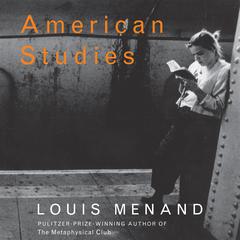 Play Audiobook Sample
Play Audiobook Sample
The Metaphysical Club (Abridged): A Story of Ideas in America Audiobook
 Play Audiobook Sample
Play Audiobook Sample
Quick Stats About this Audiobook
Total Audiobook Chapters:
Longest Chapter Length:
Shortest Chapter Length:
Average Chapter Length:
Audiobooks by this Author:
Publisher Description
Hardly a club in the conventional sense, the organization referred to in the title of this superb literary hybrid—part history, part biography, part philosophy— consisted of four members and probably existed for less than nine months. Yet its impact upon American intellectual life remains incalculable. Louis Menand masterfully weaves pivotal late 19th-and early 20th-century events, colorful biographical anecdotes, and abstract ideas into a narrative whole that both enthralls and enlightens. The Metaphysical Club is a compellingly vital account of how the cluster of ideas that came to be called pragmatism was forged from the searing experiences of its progenitors' lives. Here are Oliver Wendell Holmes, Jr., Charles Sanders Peirce, William James, and John Dewey, all of them giants of American thought made colloquially accessible both as human beings and as intellects.
Download and start listening now!
"This had been on my to-read list for far too long after todd highly recommended it. I finally got around to it this Fall, starting with little bits before I went to bed, and eventually going through most of it during Christmas vacation. The book provides biographies of Oliver Wendell Holmes, Charles S. Peirce, William James and John Dewey, winding its way through the interesting features of their intellectual backgrounds (and there are quite a few) and the way their lives brought them to interact. The title comes from a short-lived discussion group James, Peirce and Holmes attended, one of a number of such groups with shifting members in Cambridge over the years. Menand's prose is generally smooth, occasionally spirited, and never obscures any of the philosophical ideas, of which his knowledge seems solid and his presentation is clear. Definitely worth reading for anyone even dimly interested philosophy, history, and science. Plus, I'll lend you todd's copy if you want to read it."
— Anthony (4 out of 5 stars)
Quotes
-
“The Metaphysical Club is dramatic and persuasive…Something very like a history of the American mind at work.”
— New York Review of Books -
“[A] detailed and fascinating essay on the history of American intellectual life…It enlivens virtually everything it touches.”
— Economist -
“If you can read only one book about pragmatism and American culture, this is the book to read.”
— American Scientist -
“Brilliant…Menand brings rare common sense and graceful, witty prose to his richly nuanced reading of American intellectual history.”
— New York Times Book Review
Awards
-
A New York Times bestseller
-
Winner of the 2002 Pulitzer Prize for History
-
A New York Times Editor’s Choice
-
Winner of the 2002 Parkman Prize for the Society of American Historians
-
A 2001 Los Angeles Times Book Prize Nominee for History
The Metaphysical Club Listener Reviews
-
" What an eloquent, idiosyncratic reread. Menand is an original. And his suggestion, at the very end, of the new timeliness of these ideas...great. Heading right to Dewey now. "
— Ian, 2/19/2014 -
" In general, I have liked the Pulitzer Prize winners in History books and have read many of the more recent ones. I didn't like this one as much as the others. It is well written, but you have to take it a little bit slower than you would otherwise to really understand what the author is saying. You would like this if you like Philosophy because it really is a book about some of the famous American philosophers post Civil War era - like William James, Dewey, Peirce and Holmes. The main premise is that some of the "rights" that we enjoy today - like freedom of speech, weren't really part of our society's expectation until some of these men articulated that and made it a part of our culture. "
— Willis, 2/17/2014 -
" This is the book that made me want to go to graduate school. "
— Kristen, 2/11/2014 -
" I really admire this examination of the origin, history, and application of pragmatist theory. I now consider myself more of a pragmatic thinker. "
— Lia, 2/7/2014 -
" Gets fantasticker as it winds up to the end. "
— Barron, 1/31/2014 -
" Thought provoking read....The Author covers alot in roughly 500 pages regarding how thought and ideas became prevalent in American Society. "
— Diane, 1/26/2014 -
" Enjoyed the original, but the book on tape version made me fall asleep. "
— Nat, 1/8/2014 -
" This was the required reading for my first year of law school. "
— Sarah, 1/4/2014 -
" A fascinating look into the ideas of a generation. Intellectual history at its best. "
— Beth, 11/14/2013 -
" A fascinating examination of the some of the most influential minds and thought of the 20th century. "
— Kennan, 8/22/2013 -
" Indispensable reading for anyone interested in particularities of the evolution of ideas that shaped the American way thinking. Read it in tandem with Colm Toibin's "The Master" and you'll be in for a true feast of the mind. "
— Iris, 8/18/2012 -
" Menand is a master storyteller. Turned a topic I knew little about in to something interesting, and the angle of ideas emerging from the group makes for intriguing comparison with my current writing fiefdom of Japan. "
— Chris, 8/3/2012 -
" What a great overview of American intellectual history. I definitely plan on revisiting this one. "
— Rachael, 2/6/2012 -
" Such great perspectives from the giants of American philosophers... Post the civil war, it made me want to start my very own metaphysical club, and bring along this book so I can read passages from it before each meeting! "
— Affandi, 10/31/2011 -
" As a self-proclaimed pragmatist I feel I need to know the history of my philosophy. "
— Caitlin, 5/2/2011 -
" Long and academic with few signposts to guide you through it, however there are some really interesting syntheses within. Worth trudging through. "
— Michael, 2/22/2011 -
" Extremely intriguing book. Great if you love history. "
— AJ, 1/25/2011 -
" Such great perspectives from the giants of American philosophers... Post the civil war, it made me want to start my very own metaphysical club, and bring along this book so I can read passages from it before each meeting! "
— Affandi, 1/11/2011 -
" Making intellectual history into this much of a page turner is quite a feet. An invaluable resource. That said I wanted to know more about Dewey's notions of reality. "
— Trevor, 9/5/2010 -
" A thorough, dazzling, exciting trip through late 19th century American thought. Menand's exquisite writing makes these ideas and figures compelling and modern and in the end utterly absorbing and thought-provoking. This might be my new favorite book. "
— Rachel, 6/23/2010
About Louis Menand
Louis Menand is professor of English at Harvard University and a staff writer at the New Yorker. His books include The Metaphysical Club, which won the Pulitzer Prize in history and the Francis Parkman Prize from the Society of American Historians. In 2016, he was awarded the National Humanities Medal by President Barack Obama.
About Henry Leyva
Henry Leyva, an Earphones Award-winning narrator, is a classically trained actor with extensive work in theater, television, film, and radio. He has appeared off Broadway and in regional theaters across the country in many plays, including Romeo and Juliet, Taming of the Shrew, and Street Car Named Desire. He has also performed in audio dramas for the Syfy Channel and National Public Radio



























